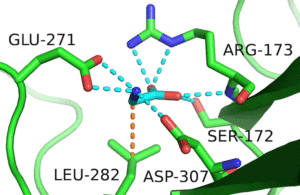
A model illustrates glycine molecules (teal) interacting with GPR158 brain cell receptors, influencing the nervous system. [Martemyanov lab, The Wertheim UF Scripps Institute]
Formerly known as GPR158, mGlyR is a specific brain receptor type that responds to certain chemical signals. In addition to depression, researchers have linked mGlyr to cancer development and cognition. GPR158 directly interacts with a chemical known as glycine, which plays a role in various brain functions.
Both glycine and aurine affect mGlyR. Researchers believe these chemicals play a role in depression. “We have previously published research implicating GPR158 in the pathology of mood disorders,” said Kirill Martemyanov, professor and chair of the department of neuroscience at Scripps Biomedical Research. “Specifically, we found it to be upregulated in humans suffering from major depressive disorder and in mice subjected to stress, which is a major aggravating factor for depression.”
A 1995 study in European Neuropsychopharmacology found that glycine and taurine and other excitatory amino acids are dysregulated in the plasma of humans diagnosed with major depressive disorder. Additionally, a 2017 paper in Nature found that taurine has an antidepressant effect on stress-induced depressive rats.
“We also found that in mice, suppressing GPR158 leads to an antidepressant phenotype and resilience to stress,” Martemyanov said. “Therefore, we think that interventions aimed at blocking GPR158 would offer relief from stress-induced depression.”
mGlyR as a potential new antidepressant target

Kirill Martemyanov
The recent study in Science found that glycine, but not taurine, works through mGlyR to regulate the activity of nerve cells in the brain’s cortex. This new information could help researchers better understand how brain connections work. The authors of the study believe that “using mGlyR for glycinergic signaling has implications for understanding mood disorders and for developing new treatment strategies.”
“We now know a new molecular system that regulates mood and gets dysregulated in affective disorders,” Dr. Martemyanov said. “We also have a target for developing medications — molecules with antagonistic activity for GPR158. Once they are developed, we can initiate clinical trials to see if our predictions in mice would bear out in humans and provide fast depression relief.”
The widespread presence of glycine and taurine, and their involvement in numerous bodily processes, limit their potential as medications. The authors note, however, that the identification of mGlyR offers a novel antidepressant target for developing new medications. The authors suspect that such novel drugs would be small molecules that specifically inhibit the mGlyR receptor, as they could prevent potential interactions with related receptors such as GPR179 found in the eye.
Implications for future depression therapies
This discovery highlights the potential for novel pharmacological strategies to address mood disorders by targeting the mGlyR receptor as an antidepressant target. Further research could lead to the development of more effective and targeted treatments for depression and other mood disorders.
Martemyanov highlighted the need for further research to better understand the balance of mGlyR receptors in the body and their effect on brain cell activity. “Glycine effects are non-specific — it engages a range of targets and is also a building block of proteins, hence metabolized easily,” he said. “We need specific small molecule drugs targeting GPR158. We also need to understand where exactly mGlyR is engaged and how it is regulated in the brain to produce effects on mood. This is the research we will be carrying out going forward.”
Filed Under: Drug Discovery, Psychiatric/psychotropic drugs



